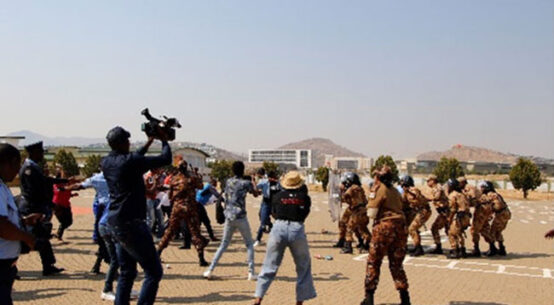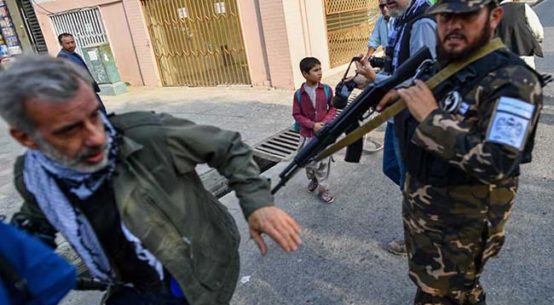
The arrest of a journalist at a private television in Zambia for allegedly destroying evidence of the leaked telephone conversation between two senior government officials has fueled speculations of government’s sincerity over its pledge to promote press freedom.
On 24 January the Zambia Police Service summoned, interrogated and later recorded a warn and caution statement from Petty Chanda, 38 a station manager at Kenmark Broadcasting Network (KBN TV) for the offense of Destroying evidence Contrary to Section 111 of the Penal Code of the laws of Zambia.
The audio which had gone viral on social media was deemed as being evidence over a conversation between two senior Government officials in which the police wanted to ascertain its source.
After interrogations, the journalist was later released, according to the Zambia police spokesperson, Rae Hamoonga after she had been warned and cautioned as investigations continue.
But the Presidency has since described the audio as hearsay, according to spokesperson Anthony Bwalya. President Hakainde Hichilema, he contended, will not act on a leaked audio until a professional investigation is done.
“…There has been no professional investigation that has been carried out to ascertain who the names of the individuals in that recording were. Everything that you and I are hearing is hearsay,” said Bwalya.
“Until and when a professional investigation has been conducted and carried out to ascertain the identities of those individuals, we shall not comment on hearsay and the President will not act on hearsay.”
Media and Information minister Chushi Kasanda heaps the blame on the journalist, Chanda for having neglected to uphold the principles of professionalism which dictates that information collected be verified before being broadcast to the public, a sentiment received with mixed feelings from interest groups.
Joan Chirwa, the Free Press Initiative (FPI) leader, urged Kasanda to choose the side of press freedom that considers the citizens’ right to know more paramount than that of those in power.
“President Hichilema has assured on many occasions that journalists in Zambia must be free to carry out their jobs and expose wrongs going on even in his own government. It seems the police missed this script. They may do well to find it and be in tune.”
Other civil right campaigner’s human rights experts have raised eyebrows and attribute the action by the state to have drawn powers from the Cyber Security and Cyber Crimes Act, enacted in 2021 which seeks to superintend over people using the internet or other electronic devices.
Under the law, the state security agents are empowered to act if any accused person refuses to cooperate with or hinders a cyber inspector from conducting a lawful search or seizure, experts argue.
Arguably, while the Cyber Security and Cyber Crimes Act, seeks to promote the “responsible use of social media platforms”, it may also allow the government to listen to people’s conversations without a court order, it reads in part.
The arrest of Chanda by the Zambia Police Service has drawn mounting criticism from various interest groups.
The interest groups contend that the Government may have reneged on the ruling United Party for National Development (UPND) Government pledges made prior to ascending to power on 12 August.
The party had ascended to power on the bedrock of uphold press freedom and other civil liberties while pledging to ensure that people’s liberties to free speech, and association among other rights will be promoted.
ActionAid Zambia country Director Naluca Zuba is disappointed by the way the administration as harassing the media and may be discouraged from undertaking their roles of ‘fourth estates’
“Our take as ActionAid is that we are concerned and worried with the constant summoning of the media personnel and owners over the so-called leaked audio. I believe as much as there are media ethics and freedoms, we should never forget the underlying fact that the role of the media is to inform and educate and the investigative wings are therefore tasked to investigate to establish if the audio is fake or not,” she said in a statement.
And various civil society groups have poured scorn over the Government’s alleged ‘recent breaches of the rule of the law’ which have potential to undermine the country’s human rights record and the rule of law.
In a statement, the civil right campaigners are particularly concerned with the silence of the President regarding the leaked audio that implicates senior members of the Government.
This, they argue, is a contrast to what the President committed at ascendance to power on 24 august to the promotion of National Unity, Good Governance, and Adherence to the Rule of Law and seeks urgent intervention as it borders on undermining State Institutions and the Rule of Law.
Last year Civil Society Organisations had petitioned the Lusaka High Court accusing the government of violating the Constitution through the enactment of the Cyber Security and Cyber Crimes Act.
Chapter One Foundation, Bloggers of Zambia, Gears Initiative, People’s Action for Accountability and Good Governance in Zambia and the Alliance for Community Action, a consortium, had contended that the law threatens the right to protection of the law and the right to freedom of expression, among other constitutionally guaranteed rights.
The campaigners had sought a remedy from the courts that the Act be declared unconstitutional.




